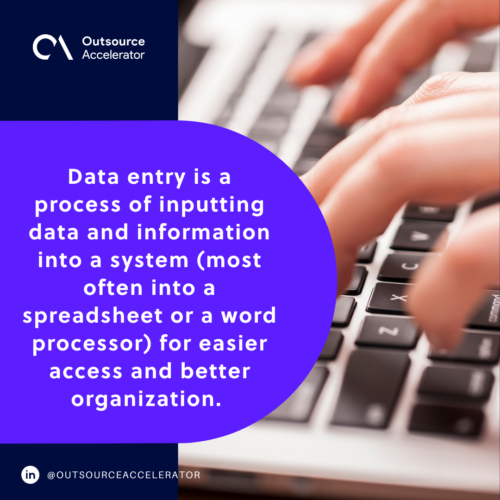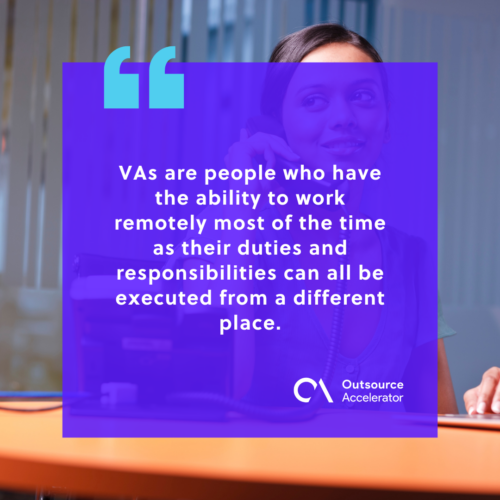Data entry work for virtual assistants

Virtual assistants (VAs) wear multiple hats to fit multiple roles. From content creation to scheduling meetings, VAs are a godsend to busy executives everywhere.
It’s not a surprise to most when VAs tend to take on more responsibilities. After all, most of the job descriptions for VAs are more general in comparison to other positions.
So when it comes to delegating tasks to your virtual assistants, what responsibilities come to mind? To some, they might say administrative tasks and other back office work. But if we’re being specific, data entry works perfectly for qualified VAs.
Tip: There are tons of online crash courses for people wanting to be a VA out there. You just need to know where to look.
What is data entry?
Data entry is a process of inputting data and information into a system (most often into a spreadsheet or a word processor) for easier access and better organization. It involves good hand and eye coordination, attention to detail, and the ability to do repetitive tasks for hours on end.
Some might argue that it’s just another boring desk job — when in reality, it’s an important and underappreciated role in a company.
Without data entry virtual assistants, most of the company archives will be gathering dust in a file cabinet. As mentioned above, data entry involves ensuring that those old information sheets aren’t lost for good.
In the 21st century, having digital backups of everything pays off in the long run. With backups, you don’t need to worry about losing track of your data ever again.

What are virtual assistants?
Virtual assistants, like traditional ones, support their clients on a day-to-day basis. They make sure that there are no hiccups in their daily tasks.
VAs have been popping up everywhere ever since the rise of the gig economy. Recently, people have been leaving their office jobs for something flexible — a job that allows them to spend more time outside of work.
Virtual assistants, as the name suggests, are people who have the ability to work remotely most of the time, as their duties and responsibilities can all be executed from a different place. Learn more about the VA’s perks (and cons) of working from home.
While most of us can handle our duties without the help of a virtual assistant, some executives would benefit from one. It’s not just about making others do things for you — it’s about reclaiming your time.
In further focus, a data entry virtual assistant is a professional who provides remote support in managing and inputting data for businesses.
Their primary responsibilities include entering, updating, and organizing various types of information, like business data, into databases, spreadsheets, or other systems.
Data entry virtual assistants ensure accuracy, efficiency, and confidentiality in handling data processing tasks.
They offer specific support services that contribute to streamlined operations and allow businesses to focus on core activities. They do all that while maintaining organized and accurate records.
Ultimately, one of the advantages of hiring a data entry virtual assistant is that it allows you to be more concentrated, flexible, and efficient.
We don’t have the same 24 hours, so make better use of yours. Let someone else do the data entry tasks and other tedious work for you.
If you are interested in acquiring virtual assistant services but confused about where to start, you can partner with a third-party service provider, such as HireSmart Staff, to assist you in finding the best virtual assistant for your company.

What do virtual assistants do?
We mentioned at the beginning of the article that VAs wear many different hats to fit the role. So, your responsibility to compensate them will depend on the value they add to your business.
If you hire data entry virtual assistants to perform your business’ administrative tasks and other roles, you’ll have plenty of time on your hands to focus on the core aspects of your company.
Responsibilities of data entry virtual assistants
One of the advantages of hiring a virtual assistant is that it allows you to be more concentrated, flexible, and efficient. We don’t have the same 24 hours, so make better use of yours.
Once you decide to hire virtual assistants, here are some of the responsibilities you can delegate to them:
Maintenance of data and contact sheets
As someone’s assistant (whether you’re virtual or an office-based one), VAs are expected to handle at least a workload of maintaining contact books.
Digitization of files
Clients with a plethora of files and folders just waiting to be encoded and backed up onto the cloud can delegate these tasks to their trusted VA.
Organization of work and personal calendars
A task is as old as time. All assistants, not just the virtual ones, are offloaded with the responsibility of organizing their client’s work and personal calendars.
From booking a meeting to blocking off a weekend for a mini-vacation, VAs have the power to schedule their clients to the brim.
Daily support
Taking meeting notes, whipping up a newsletter, sending emails, and rerouting calls are what VAs do in general. VAs are a jack of all trades, but they usually excel at one or two specific responsibilities.

Can virtual assistants do data entry?
Data entry is a well-known administrative task. Its responsibilities include managing, reviewing, and arranging paperwork and files. Most VAs should be able to juggle the roles of a data entry clerk.
Remember that as an employer, it’s your job to indicate what the role is for properly. There are multiple cases in which employers fail to assimilate the difference between having virtual assistants and administrative clerks.
To further clarify, some jobs may overlap between the two. Virtual assistants often work with clients as an individual support system, while administrative clerks work within departments.
That being said, virtual assistants drive value to the companies and businesses they choose to work with. From making sure that the day goes by smoothly to juggling tasks for their clients, investing in a good VA pays off in the long run.
Benefits of having data entry virtual assistants
Here’s why having a virtual assistant dedicated to data entry can be a game-changer:
Access to precision and accuracy
Data entry demands precision, and virtual assistants excel in delivering accurate results.
With a keen eye for detail, they ensure that every piece of information is entered with the utmost accuracy. They help eliminate the risks associated with manual data input.
Time optimization
By delegating data entry tasks to a virtual assistant, businesses reclaim valuable time. This time optimization allows teams to focus on all the tasks that elevate business performance.
As a result, VAs can drive productivity and contribute to overall organizational success.
Opportunity for cost-efficiency
Hiring a full-time, in-house data entry specialist can be costly. Opting for a virtual assistant provides a cost-effective solution without compromising on the quality of work.
Businesses save on overhead expenses, making it a budget-friendly choice because it can shrink data entry expenses and let you have zero payroll hassles.
Scalability and flexibility
Whether you have a sudden surge in data entry tasks or a steady flow, a data entry virtual assistant adapts seamlessly.
The scalability and flexibility they offer ensure that your business can handle varying workloads efficiently without the need for constant adjustments.
Better data security
Data entry VAs prioritize confidentiality and employ secure practices, safeguarding sensitive information.
This commitment to data security provides peace of mind for businesses entrusting their crucial business, qualitative, and customer data to virtual assistants.







 Independent
Independent




